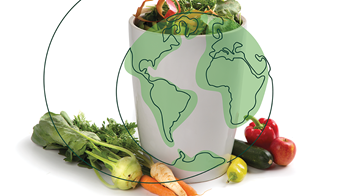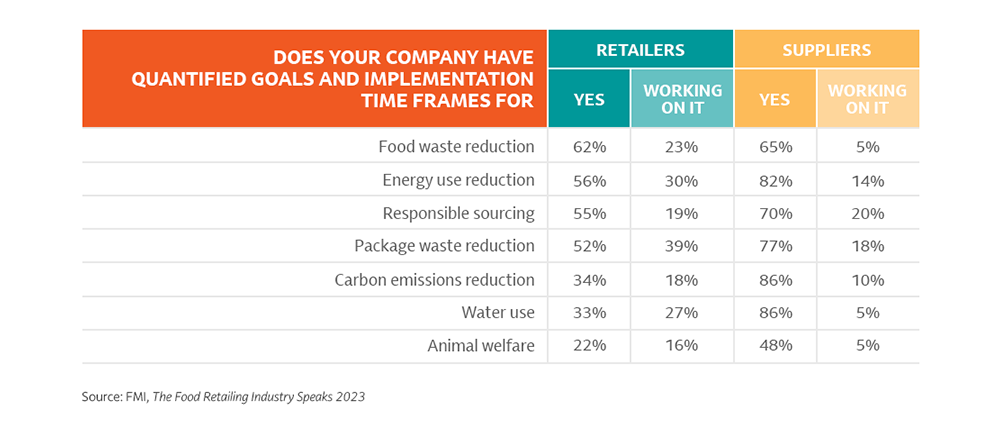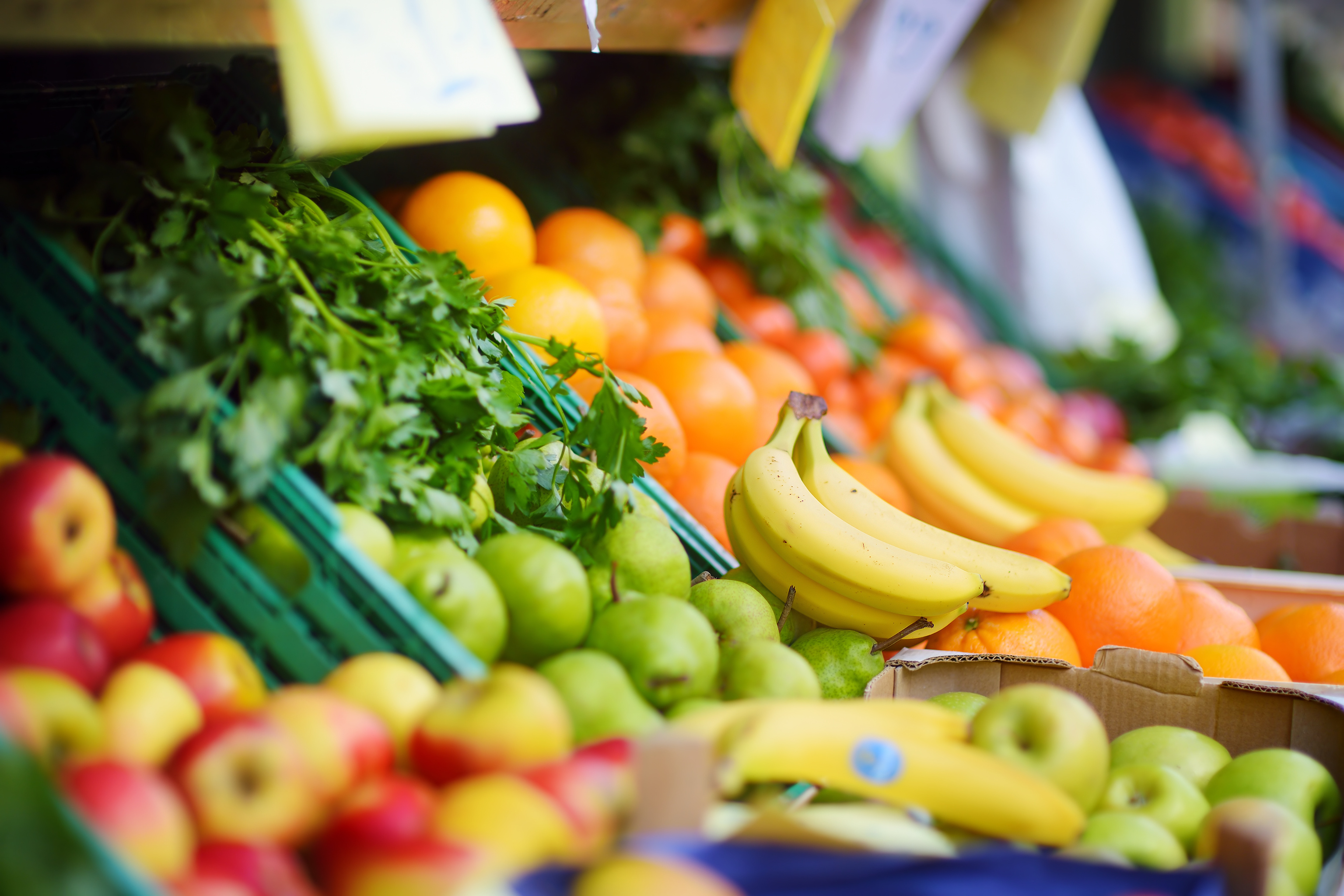This is the fifth installment in the FMI blog series on sustainability in the food industry. This series shares compelling research and covers aspects ranging from consumer perspectives to industry opportunities.
By: Andy Harig, Vice President, Tax, Trade, Sustainability & Policy Development, FMI

It's hard to know how you're doing if you don't measure.
This is especially true with a complex topic like sustainability. That's why each year FMI's The Food Retailing Industry Speaks research tracks sustainability efforts.
The latest results show how retailers and suppliers are making sustainability a priority with quantified goals and implementation time frames for a wide range of strategies.
These include responsible sourcing and reduction of food waste, energy use and package waste.
Sustainability as a Differentiator
Many food retailers and suppliers have been leveraging sustainability to differentiate their businesses.
- 55% of retailers used social and environmental responsibility in 2022 as a service differentiation strategy.
- 59% of retailers and 65% of suppliers used eco-friendly or sustainable living products as a product differentiation strategy.
Companies report mixed levels of success so far. For example, among companies using eco-friendly or sustainability product strategies, 26% of retailers and 36% of suppliers cite success. One likely reason for mixed success is that some consumers who want sustainable products may not be willing to pay more for them. Over time, however, the industry's efforts are likely to enhance loyalty from consumers who support sustainability goals.
Industry Goals and Time Frames
The Speaks research relays that a significant percentage of retailers and suppliers have sustainability goals and time frames in place or are working on them. Most food retailers and suppliers have quantifiable goals for food waste reduction, responsible sourcing, energy use reduction and package waste reduction.

Efforts of FMI and Other Industry Organizations
FMI and other industry organizations are helping to support companies' sustainability goals through strategies, partnerships, resources and other solutions. Here are some examples:
- Food Donations and Waste Reduction: FMI has worked with its members to outline a set of food industry commitments to support the goals of the historic 2022 White House Conference on Hunger, Nutrition and Health. Among the commitments, FMI members will donate two billion meals in 2023 to food banks and other organizations that help support communities. Food donations reflect the industry's social responsibility goals and, in many cases, help to reduce food waste because they stop food from ending up in landfills.
- Packaging Waste Reduction: Many food industry companies have begun taking key steps toward sustainable packaging. FMI's Sustainable Packaging Assessment Guide assists retailers and their suppliers in advancing efficient design, responsible sourcing, and circular systems for packaging. This tool can support internal business operations and effective trading partner collaboration regarding sustainable packaging.
- Carbon Emissions and Climate: FMI is a member of the Food and Agriculture Climate Alliance (FACA), which helps advance climate solutions across the supply chain. FMI brings consumer insights on food loss and waste and other topics into the farm to fork alliance.
- Animal Welfare: FMI is an endorser of The Protein PACT for the People, Animals and Climate of Tomorrow. The pact is designed to accelerate momentum and verify progress toward global sustainable development goals across all animal protein sectors. Its goals include providing the most humane care and raising healthy animals.
- Energy Use Reduction: The food industry has focused on energy strategies that include conservation and advancing usage of renewable energy. Refrigeration can account for up to 60% of a grocer's energy use, according to the U.S. Environmental Protection Agency (EPA). Retailers are increasingly embracing energy-efficient refrigeration systems, such as those with natural refrigerants like CO2.
The Value of Storytelling
The food industry is making progress on sustainability and has more to do. Sustainability professionals in this industry are highly focused on the operational aspects of their work. It's important for organizations to communicate these efforts, especially to shoppers.
"We take sustainability seriously and have a state-of-the-art policy that reflects the values of consumers and our associates."
This example is just one of many ways to attract and inform customers given that it helps underscore an important point. Telling the story of an organization's sustainability commitment and efforts will help build trust over time. Building trust is invaluable for organizations in their relationships with customers and other stakeholders.


 Industry Topics address your specific area of expertise with resources, reports, events and more.
Industry Topics address your specific area of expertise with resources, reports, events and more.
 Our Research covers consumer behavior and retail operation benchmarks so you can make informed business decisions.
Our Research covers consumer behavior and retail operation benchmarks so you can make informed business decisions.
 Events and Education including online and in-person help you advance your food retail career.
Events and Education including online and in-person help you advance your food retail career.
 Food Safety training, resources and guidance that help you create a company food safety culture.
Food Safety training, resources and guidance that help you create a company food safety culture.
 Government Affairs work — federal and state — on the latest food industry policy, regulatory and legislative issues.
Government Affairs work — federal and state — on the latest food industry policy, regulatory and legislative issues.
 Get Involved. From industry awards to newsletters and committees, these resources help you take advantage of your membership.
Get Involved. From industry awards to newsletters and committees, these resources help you take advantage of your membership.
 Best practices, guidance documents, infographics, signage and more for the food industry on the COVID-19 pandemic.
Best practices, guidance documents, infographics, signage and more for the food industry on the COVID-19 pandemic.
